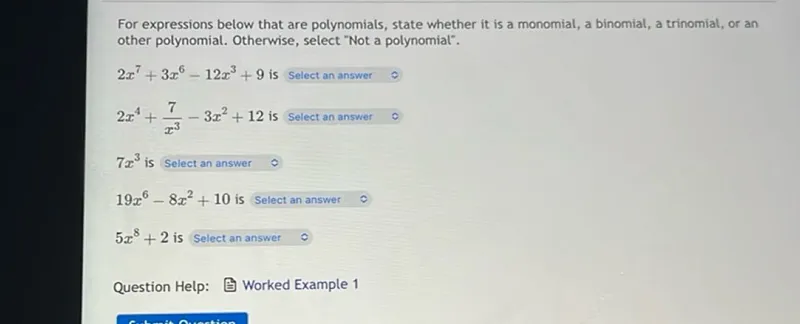Determine whether \(2x^{7} + 3x^{6} - 12x^{3} + 9\) is a monomial, binomial, trinomial, other polynomial, or not a polynomial.
Step subtitle: Identify the number of terms
The expression \(2x^{7} + 3x^{6} - 12x^{3} + 9\) has four terms: \(2x^{7}\), \(3x^{6}\), \(-12x^{3}\), and \(9\).
Step subtitle: Classify the polynomial
Since the expression has four terms, it is classified as an "other polynomial."
\(\boxed{\text{Other polynomial}}\)
Determine whether \(2x^{4} + \frac{7}{x^{3}} - 3x^{2} + 12\) is a monomial, binomial, trinomial, other polynomial, or not a polynomial.
Step subtitle: Check for polynomial conditions
The term \(\frac{7}{x^{3}}\) can be rewritten as \(7x^{-3}\), which has a negative exponent. Polynomials cannot have negative exponents.
Step subtitle: Conclusion
Since the expression contains a term with a negative exponent, it is not a polynomial.
\(\boxed{\text{Not a polynomial}}\)
Determine whether \(7x^{3}\) is a monomial, binomial, trinomial, other polynomial, or not a polynomial.
Step subtitle: Identify the number of terms
The expression \(7x^{3}\) has only one term.
Step subtitle: Classify the polynomial
Since the expression has one term, it is classified as a "monomial."
\(\boxed{\text{Monomial}}\)
Determine whether \(19x^{6} - 8x^{2} + 10\) is a monomial, binomial, trinomial, other polynomial, or not a polynomial.
Step subtitle: Identify the number of terms
The expression \(19x^{6} - 8x^{2} + 10\) has three terms: \(19x^{6}\), \(-8x^{2}\), and \(10\).
Step subtitle: Classify the polynomial
Since the expression has three terms, it is classified as a "trinomial."
\(\boxed{\text{Trinomial}}\)
Determine whether \(5x^{8} + 2\) is a monomial, binomial, trinomial, other polynomial, or not a polynomial.
Step subtitle: Identify the number of terms
The expression \(5x^{8} + 2\) has two terms: \(5x^{8}\) and \(2\).
Step subtitle: Classify the polynomial
Since the expression has two terms, it is classified as a "binomial."
\(\boxed{\text{Binomial}}\)
\(\boxed{\text{Other polynomial}}\)
\(\boxed{\text{Not a polynomial}}\)
\(\boxed{\text{Monomial}}\)
\(\boxed{\text{Trinomial}}\)
\(\boxed{\text{Binomial}}\)






